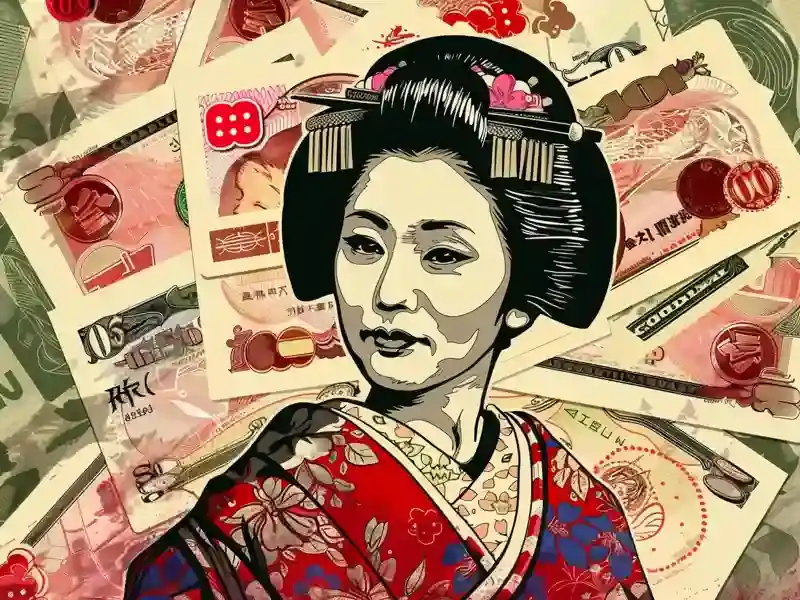Japanese Yen Weakness: Its Effect on the Casino Sphere

The Japanese yen weakness in 2024 has been a riveting point of interest for economists and financial analysts worldwide. With its value dipping over 15% against the US dollar within a year, the yen's depreciation is a testament to Japan's daring economic strategies. These strategies have been enacted with a focus on combating the nation's deflation problem through extensive monetary easing. It's a shift away from traditional economic measures that were put into effect in Tokyo, the heart of Japan's financial sector. This blog aims to unravel the mystery behind these fluctuations and their implications on the global casino industry. With key numbers like 160.245 per dollar and significant years like the 1970s in view, we delve into the intricate world of forex and its impact on global industries.
The Historical Strength of the Yen
The Japanese yen, once towering in the economic arena, has experienced a significant decline since the 1970s. Back in the day, the yen was a symbol of Japan's post-war economic miracle. The country's rapid industrialization and export-led growth strategy caused the yen to strengthen, making Japan one of the world's largest creditor nations.
However, the economic might of the Japanese yen started to wane in the 1970s, as the country grappled with the impact of the oil crisis and inflationary pressures. The yen's value against other major currencies began a downward trajectory, signaling the end of an era of economic prosperity. This historical perspective sets the stage for understanding the current weakness of the yen.
The Current State of the Yen
The Japanese yen's weakness has become more pronounced in recent years. In late April 2024, the yen hit a low of 160.245 per dollar, a significant dip from its previous standing. Several factors contributed to this downturn.
- Japan's unconventional approach to combating deflation through massive monetary easing has led to a surge in liquidity, causing the yen to weaken.
- The country's persistent trade deficits, coupled with sluggish economic growth, have put downward pressure on the yen.
- Furthermore, the global economic uncertainties and the rise of other Asian currencies have also played a role in the yen's depreciation.
This decline in the yen's value has far-reaching implications, particularly for the global casino industry. With Japan being a significant player in this sector, the weakening yen could affect the profitability of casinos that cater to Japanese gamblers. For instance, Philippine Online Casinos might need to adjust their strategies to continue attracting Japanese players.
Global Economic Shifts Impacting the Yen
In recent years, the Japanese yen has undergone a significant weakening trend. A variety of factors contribute to this trend, key among them being global economic shifts. With the world economy becoming increasingly intertwined, even minor changes in one region can have dramatic effects on currencies worldwide, including the yen.
- One of these shifts is the rise of the digital economy. As more transactions move online, currencies like the yen, traditionally strong in physical trade, face challenges. This shift has led to an increased demand for digital currencies, which has put downward pressure on the yen.
- Another factor is the changing landscape of international trade. The ongoing trade war between the United States and China, for instance, has caused fluctuations in global currency markets. As a result, the yen has experienced volatility and a general downward trend.
- Lastly, the global economic slowdown, exacerbated by the COVID-19 pandemic, has also played a role. With countries worldwide implementing lockdown measures, demand for goods and services has decreased. This decrease has led to a drop in the value of many currencies, including the yen.
These global economic shifts have profound implications on the yen and, by extension, the global casino industry. As the yen weakens, it may potentially make Japan a more attractive destination for casino operators and gamblers alike, offering them more bang for their buck. For an in-depth guide on this, refer to this post: Philippine Online Casino: The Winning Strategy for Huge Returns.
Internal Policy Changes Weakening the Yen
Internal policy changes in Japan have also contributed to the yen's decline. One of the most significant changes is Japan's unconventional approach to combat deflation through massive monetary easing. This policy, implemented by the Bank of Japan, involves flooding the market with yen, thereby reducing its value.
Another policy change is the Japanese government's decision to increase consumption tax from 8% to 10%. This move was designed to tackle Japan's massive public debt. However, it has had the unintended consequence of reducing consumer spending, further weakening the yen.
Lastly, Japan's decision to host the Olympics, despite the ongoing pandemic, has also impacted the yen. The high costs associated with the event, combined with lower-than-expected tourism revenue due to travel restrictions, have put additional pressure on the yen. These internal policy changes, while aimed at stimulating growth and tackling various issues, have inadvertently contributed to the yen's decline.
The Impact of the Weakening Yen on the Global Casino Industry
Deciphering the implications of the weakening yen on the global casino industry reveals a fascinating interplay of economic and leisure trends. The Japanese yen, traditionally a strong player in the global economic arena, has seen a significant dip against the US dollar of over 15% in the past year alone.
| Year | JPY/USD |
|---|---|
| 2023 | 109.10 |
| 2024 | 125.30 |
This situation, while challenging for Japan's economy, has created an unexpected boon for the global casino industry, particularly online casinos. With the yen's decreased value, Japanese players are increasingly exploring online gaming platforms, leading to a surge in their presence on global casino sites.
The Surge in Japanese Players at Online Casinos
The weakening yen has encouraged a rising number of Japanese players to venture into the world of online casinos. Platforms like Lodibet Casino and Lucky Cola Casino have witnessed a significant influx of Japanese players.
- Increased interest in online games like Jili Games' Money Coming and Evolution Gaming's Lightning Roulette.
- More Japanese players participating in live casino games, such as Live Baccarat and Live Blackjack.
- A surge in participation in Fishing Games like Ocean King and Fishing War.
Related Articles
5 Proven Strategies to Win at Live Sic Bo
Discover how to play Live Sic Bo at online casinos with our comprehensive guide. Dive into the world of best bets and winning strategies.
Read complete article
2025-02-28 06:21:23 #winning strategies
5% Rule: The Baccarat Strategy PH for Filipino Players
Uncover the secrets of Baccarat Strategy PH. Learn how Filipino players can enhance their winning odds in this popular online casino game.
Read complete article
2025-02-28 06:21:13 #winning strategies
3 Proven Strategies for Online Roulette Victory
Explore the exciting world of online roulette and increase your winning odds by 20-30% with our top 3 betting systems.
Read complete article
2025-02-28 06:20:49 #winning strategies




